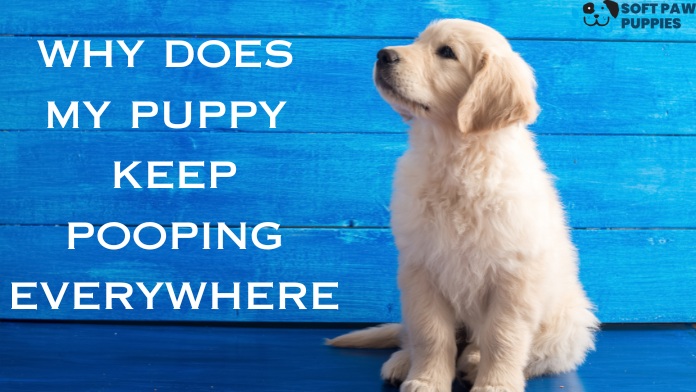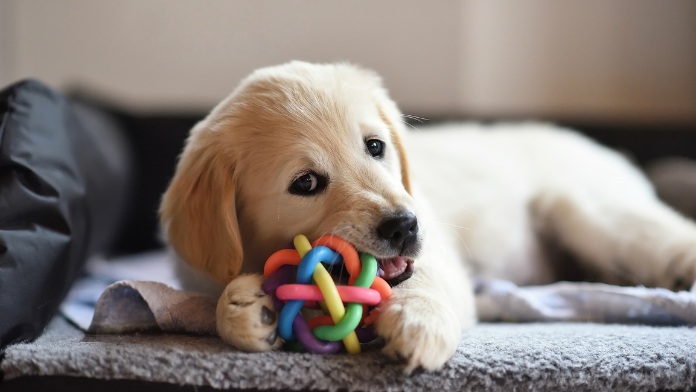
A common frustration many new puppy owners face is the question, “Why does my puppy keep pooping everywhere?” It’s a valid concern, as housebreaking a puppy can be daunting. However, before you get too discouraged, it is essential to understand that this behavior is completely normal in young dogs. This comprehensive guide will explore the reasons behind this behavior and provide practical solutions to help housetrain your puppy.
Why Does My Puppy Keep Pooping Everywhere?
Puppies may poop everywhere for a variety of reasons. Lack of proper potty training, an unfamiliar environment, stress, dietary, and medical issues can all contribute to this behavior. Establishing a consistent routine, positive reinforcement, and patience can help address this issue. If problems persist, consult a veterinarian or professional trainer for guidance on resolving your puppy’s defecation problems.
How Do I Get My Puppy to Stop Pooping Everywhere?
To prevent your puppy from pooping everywhere, follow these steps:
- Establish a regular feeding schedule.
- Take your puppy outside after meals, playtime, and naps.
- Use positive reinforcement when they poop outdoors.
- Monitor them closely indoors and watch for signs that they should leave.
- Clean up accidents promptly to eliminate odors.
- Be patient and consistent with training.
- Seek professional guidance if problems persist.
Reasons Why Your Dog May be Pooping at Home

It can be frustrating and worrying if your dog has been constantly pooping in the house. This behavior may indicate underlying problems that need to be addressed.
Here are several reasons why your dog may be pooping at home:
Lack of Proper Training
One of the most common reasons for indoor accidents is lack of proper training. If your dog was not properly housetrained as a puppy, he may need help understanding where it is appropriate to relieve himself.
Medical Problems
Medical problems such as gastrointestinal disorders, parasites, or urinary tract infections can cause dogs difficulty controlling their bowel movements. If your dog’s defecation indoors is sudden or accompanied by other concerning symptoms, consult your veterinarian.
Stress and Anxiety
Dogs can be sensitive to changes in their environment or routine. Stressful situations, such as moving to a new home, introducing a new pet, or changing family dynamics, can lead to anxiety-related accidents.
Age-Related Problems
As dogs age, they may experience a loss of muscle control, similar to that of elderly humans. This can cause accidents around the house, especially in older dogs.
Inadequate Exterior Access
If your dog does not have easy access to the outdoors, he may be unable to go outside when necessary. This can be a problem if she works long hours or lives in an apartment without easy access to the outside.
Behavior Problems
Certain behavioral issues, such as territorial demarcation or a lack of respect for established boundaries, can lead to indoor pooping. These problems may require behavior modification training.
Dietary Factors
Diet plays a crucial role in your dog’s digestive health. Inappropriate or poor-quality foods can cause irregular bowel movements and accidents. Make sure your dog’s diet is appropriate for her age and breed.
Lack of Routine
Dogs thrive on routines. If their feeding and bathing schedules are inconsistent, they may be unable to predict when they need to go out.
Overexcitement
Some dogs become so excited that they cannot control their bodily functions. This usually happens when they greet their owners after a long absence.
Unknown Environment
When dogs are in an unfamiliar environment, such as a friend’s house or a hotel, they may need help recognizing where to go to the bathroom.
How do I Get my Dog to Poop Outside Again?
To encourage your dog to poop outside, follow these steps:
- Establish a Routine: Create a consistent daily feeding and bathroom breaks schedule.
- Supervise Actively: Keep a close eye on your dog and take them outside when they show signs of needing to poop.
- Designate a Bathroom Spot: Choose a specific outdoor area for them to visit and take them there consistently.
- Positive Reinforcement: Praise and reward your dog when they poop outside.
- Be Patient: Avoid scolding for indoor accidents, which can create anxiety.
- Regular Exercise: Ensure your dog gets enough physical activity to stimulate their digestive system.
- Controlled Feeding: Feed your dog at the same times daily to regulate their bowel movements.
- Clean Accidents Thoroughly: Use an enzymatic cleaner to remove the scent of indoor accidents.
- Consult a Professional: If problems persist, seek advice from a dog trainer or vet.
- Stay Calm and Positive: Maintain a positive attitude during the training process.
The Importance of Positive Reinforcement
When working on housebreaking your puppy, it’s crucial to use positive reinforcement techniques. Punishing your puppy for accidents can lead to fear and anxiety, worsening the problem. Instead, reward them when they do their business outside and avoid scolding them for indoor accidents. This positive approach will help your puppy associate the right behavior with positive outcomes.
When to See The Vet Because Your Dog is Pooping in The House

If your dog is consistently pooping in the house despite training efforts, consult a vet if:
- Sudden Change: The behavior is a sudden change in their bathroom habits.
- Accompanied by Other Symptoms: Pooping indoors is accompanied by health issues like diarrhea, vomiting, or lethargy.
- Age-Related: For elderly dogs experiencing loss of bowel control.
- Previous Training: You’ve tried training without improvement.
A vet can rule out medical causes and guide on addressing behavioral or health-related issues causing indoor accidents. This allows the vet to rule out any intestinal parasites. During the appointment, your veterinarian may suggest the following diagnostic tests:
- A fecal test
- Bloodwork
- X-rays
Common Pitfalls to Avoid
While you’re on your journey to potty training success, it’s essential to be aware of common mistakes to avoid.
Punishment
Avoid scolding or punishing your puppy for accidents. This can lead to fear and anxiety.
Inconsistent Training
Consistency is key in potty training. Make sure everyone in your household follows the same rules and routines.
Conclusion
If you’re wondering why your puppy keeps pooping everywhere, remember that it’s a common issue that can be addressed with patience, consistency, and understanding. Your puppy is still learning and growing, and accidents are a part of the process. By following a regular feeding schedule, providing proper training, and creating a stress-free environment, you can help your puppy become housetrained.
FAQ
Why Does My Puppy Poop in The House After Going Outside?
Your puppy may poop indoors after going outside due to several reasons. It could be they didn’t fully empty their bowels outside, a medical issue, or they may still need to grasp the concept of potty training.
Why Does My Ten-Week-Old Puppy Keep Pooping in the House?
A ten-week-old puppy may poop indoors due to its young age and developing control over bodily functions. Insufficient potty training, an inconsistent routine, or inadequate supervision could also contribute. Focus on consistent training, frequent outdoor trips, and positive reinforcement to help your puppy learn to eliminate outside.
How to Punish Dogs for Pooping in the House?
Avoid punishing your puppy for indoor elimination. Instead, focus on cleaning up any soiled areas. Actions like rubbing your puppy’s nose in it, scolding them, or any form of punishment will only create fear and make them hesitant to eliminate your presence. Punishment can be counterproductive and harmful to their training progress.
How to Stop Dog Anxiety Pooping?
To prevent dog anxiety pooping, establish a routine, offer reassurance, and use calming techniques like soothing music or toys. Gradual exposure to stressors can help desensitize them. Consult a vet or professional trainer if the issue persists, as anxiety pooping may require specialized treatment or medication.






